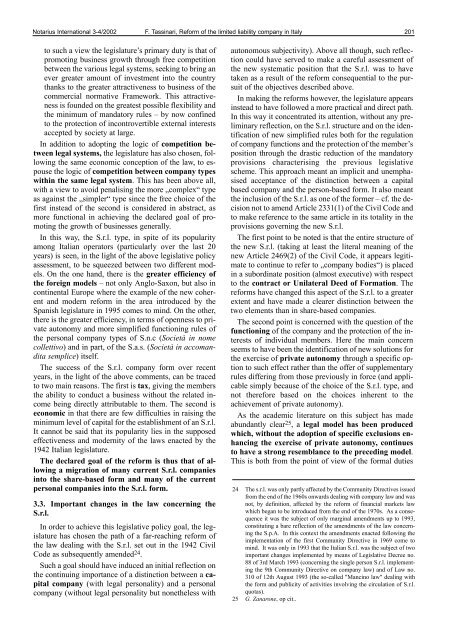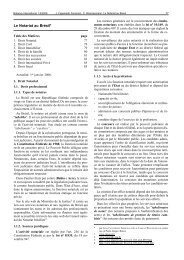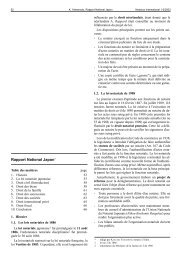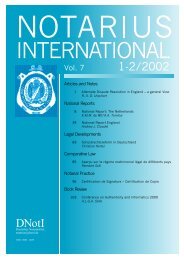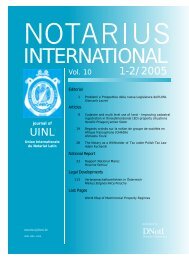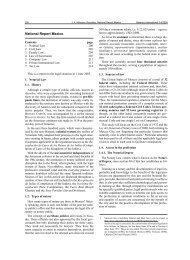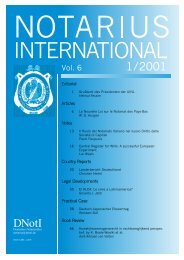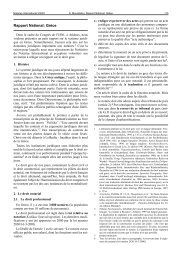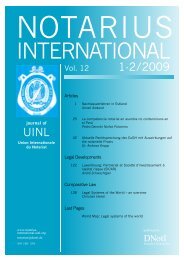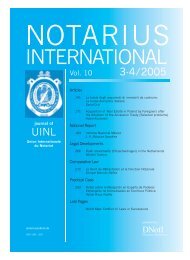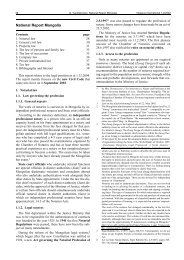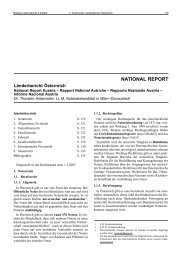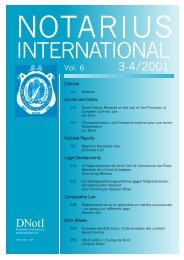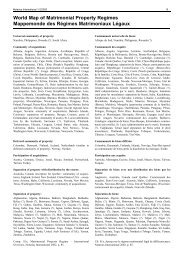ARTICLES and NOTES - Notarius International
ARTICLES and NOTES - Notarius International
ARTICLES and NOTES - Notarius International
You also want an ePaper? Increase the reach of your titles
YUMPU automatically turns print PDFs into web optimized ePapers that Google loves.
<strong>Notarius</strong> <strong>International</strong> 3-4/2002 F. Tassinari, Reform of the limited liability company in Italy 201<br />
to such a view the legislature’s primary duty is that of<br />
promoting business growth through free competition<br />
between the various legal systems, seeking to bring an<br />
ever greater amount of investment into the country<br />
thanks to the greater attractiveness to business of the<br />
commercial normative Framework. This attractiveness<br />
is founded on the greatest possible flexibility <strong>and</strong><br />
the minimum of m<strong>and</strong>atory rules – by now confined<br />
to the protection of incontrovertible external interests<br />
accepted by society at large.<br />
In addition to adopting the logic of competition between<br />
legal systems, the legislature has also chosen, following<br />
the same economic conception of the law, to espouse<br />
the logic of competition between company types<br />
within the same legal system. This has been above all,<br />
with a view to avoid penalising the more „complex“ type<br />
as against the „simpler“ type since the free choice of the<br />
first instead of the second is considered in abstract, as<br />
more functional in achieving the declared goal of promoting<br />
the growth of businesses generally.<br />
In this way, the S.r.l. type, in spite of its popularity<br />
among Italian operators (particularly over the last 20<br />
years) is seen, in the light of the above legislative policy<br />
assessment, to be squeezed between two different models.<br />
On the one h<strong>and</strong>, there is the greater efficiency of<br />
the foreign models – not only Anglo-Saxon, but also in<br />
continental Europe where the example of the new coherent<br />
<strong>and</strong> modern reform in the area introduced by the<br />
Spanish legislature in 1995 comes to mind. On the other,<br />
there is the greater efficiency, in terms of openness to private<br />
autonomy <strong>and</strong> more simplified functioning rules of<br />
the personal company types of S.n.c (Società in nome<br />
collettivo) <strong>and</strong> in part, of the S.a.s. (Società in accom<strong>and</strong>ita<br />
semplice) itself.<br />
The success of the S.r.l. company form over recent<br />
years, in the light of the above comments, can be traced<br />
to two main reasons. The first is tax, giving the members<br />
the ability to conduct a business without the related income<br />
being directly attributable to them. The second is<br />
economic in that there are few difficulties in raising the<br />
minimum level of capital for the establishment of an S.r.l.<br />
It cannot be said that its popularity lies in the supposed<br />
effectiveness <strong>and</strong> modernity of the laws enacted by the<br />
1942 Italian legislature.<br />
The declared goal of the reform is thus that of allowing<br />
a migration of many current S.r.l. companies<br />
into the share-based form <strong>and</strong> many of the current<br />
personal companies into the S.r.l. form.<br />
3.3. Important changes in the law concerning the<br />
S.r.l.<br />
In order to achieve this legislative policy goal, the legislature<br />
has chosen the path of a far-reaching reform of<br />
the law dealing with the S.r.l. set out in the 1942 Civil<br />
Code as subsequently amended 24 .<br />
Such a goal should have induced an initial reflection on<br />
the continuing importance of a distinction between a capital<br />
company (with legal personality) <strong>and</strong> a personal<br />
company (without legal personality but nonetheless with<br />
autonomous subjectivity). Above all though, such reflection<br />
could have served to make a careful assessment of<br />
the new systematic position that the S.r.l. was to have<br />
taken as a result of the reform consequential to the pursuit<br />
of the objectives described above.<br />
In making the reforms however, the legislature appears<br />
instead to have followed a more practical <strong>and</strong> direct path.<br />
In this way it concentrated its attention, without any preliminary<br />
reflection, on the S.r.l. structure <strong>and</strong> on the identification<br />
of new simplified rules both for the regulation<br />
of company functions <strong>and</strong> the protection of the member’s<br />
position through the drastic reduction of the m<strong>and</strong>atory<br />
provisions characterising the previous legislative<br />
scheme. This approach meant an implicit <strong>and</strong> unemphasised<br />
acceptance of the distinction between a capital<br />
based company <strong>and</strong> the person-based form. It also meant<br />
the inclusion of the S.r.l. as one of the former – cf. the decision<br />
not to amend Article 2331(1) of the Civil Code <strong>and</strong><br />
to make reference to the same article in its totality in the<br />
provisions governing the new S.r.l.<br />
The first point to be noted is that the entire structure of<br />
the new S.r.l. (taking at least the literal meaning of the<br />
new Article 2469(2) of the Civil Code, it appears legitimate<br />
to continue to refer to „company bodies“) is placed<br />
in a subordinate position (almost executive) with respect<br />
to the contract or Unilateral Deed of Formation. The<br />
reforms have changed this aspect of the S.r.l. to a greater<br />
extent <strong>and</strong> have made a clearer distinction between the<br />
two elements than in share-based companies.<br />
The second point is concerned with the question of the<br />
functioning of the company <strong>and</strong> the protection of the interests<br />
of individual members. Here the main concern<br />
seems to have been the identification of new solutions for<br />
the exercise of private autonomy through a specific option<br />
to such effect rather than the offer of supplementary<br />
rules differing from those previously in force (<strong>and</strong> applicable<br />
simply because of the choice of the S.r.l. type, <strong>and</strong><br />
not therefore based on the choices inherent to the<br />
achievement of private autonomy).<br />
As the academic literature on this subject has made<br />
abundantly clear 25 , a legal model has been produced<br />
which, without the adoption of specific exclusions enhancing<br />
the exercise of private autonomy, continues<br />
to have a strong resemblance to the preceding model.<br />
This is both from the point of view of the formal duties<br />
24 The s.r.l. was only partly affected by the Community Directives issued<br />
from the end of the 1960s onwards dealing with company law <strong>and</strong> was<br />
not, by definition, affected by the reform of financial markets law<br />
which began to be introduced from the end of the 1970s. As a consequence<br />
it was the subject of only marginal amendments up to 1993,<br />
constituting a bare reflection of the amendments of the law concerning<br />
the S.p.A. In this context the amendments enacted following the<br />
implementation of the first Community Directive in 1969 come to<br />
mind. It was only in 1993 that the Italian S.r.l. was the subject of two<br />
important changes implemented by means of Legislative Decree no.<br />
88 of 3rd March 1993 (concerning the single person S.r.l. implementing<br />
the 9th Community Directive on company law) <strong>and</strong> of Law no.<br />
310 of 12th August 1993 (the so-called "Mancino law" dealing with<br />
the form <strong>and</strong> publicity of activities involving the circulation of S.r.l.<br />
quotas).<br />
25 G. Zanarone, op cit..


